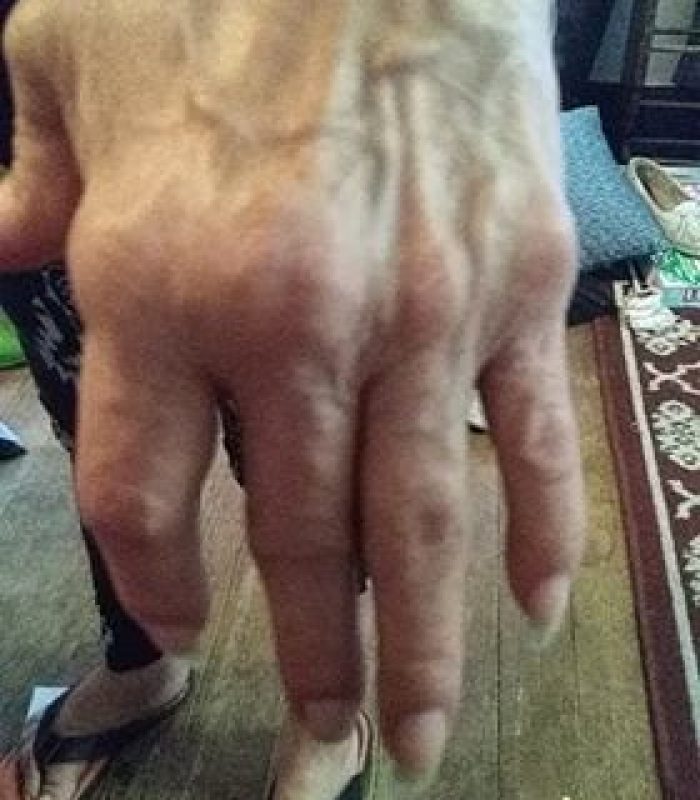After a fall that resulted in back surgery, I was locked in a haze of painkillers, unable to work.
My name is Jim Preston. I am an Army Vet, and 20 plus year Firefighter / EMT. And employee of a big box hardware chain.
Three years ago, I fell on ice doing my job one morning. I got up, brushed off and reported it. The next day I was in enough pain to go to the doctor. I was placed on meds, and sent to physio. They used mechanical traction on my neck and heat. Four months of this and no relief. Finally they did an MRI, which showed 3 fractured vertebrae.
I had a triple fusion and 2 discs replaced. I was sent back to work full time (with restrictions) along with Vicodan and muscle relaxers. This resulted in me leaving work for the emergency room 2 to 3 times a week, where I was given Valium.
With no improvement, I started to get depressed and had thoughts of suicide. I finally ended up in a pain management centre – where they put me on a Fentanyl patch, Vicodan, and Zoloft.
Nothing changed…except now I was a zombie. And I was angry! Every time I heard the fire house go down the hill, I cried. I didn’t want to live anymore. The pain was constant and the meds made me feel dead. I felt worthless. A burden.

RSO – Rick Simpson Oil
I started researching. I found RSO – Rick Simpson Oil. Or high concentration cannabis oil. I acquired flower and followed directions on the Phoenix Tears site and made my own.
The day I took the first dose of oil, I took off the patch, put the pills in the closet and said never again! The withdrawal was the worse 10 days of my life. And I wasn’t an addict…I used the meds exactly as prescribed, but the body gets used to it. It hurts when it leaves. Fuck you – never again!
When I came out the other end of that week an a half. I couldn’t believe how I felt. With nothing but 3 grain of rice size doses of oil, wrapped in a little piece of bread. Each day I felt better. I learned to work my dosing as I became more used to the oil. And I’ve learned how to adjust my dosing when I over do it. Or the weather gives me a bad day.
I thought – am I crazy? Does this actually work? Maybe I didn’t feel as bad as I thought. I found the answer to that question the day I ran out of oil…now I have a MMJ card and insurance covers it. Workers compensation commissioner has ordered the insurance to pay for my medication and my out of pocket since last August. I am now the second person in the state to receive this. WE ARE SETTING PRECEDENTS!
Editor’s Note: Please read update below. The insurance company has since refused to pay.

Reach Out to A Vet
I have never seen anything or anyone as caring or as giving as the cannabis community. You all make me so thankful. I am also greatly thankful for my friend, Sean Judge, who saw the dark place I was in and brought me into this community through the New England Veterans Alliance. And I’m more than honored to now serve as their director of operations.
Thanks to all these things, I look forward to continuing to pay the good forward and teach the benefits of this incredible plant.
Thank you RxLeaf, for the opportunity to tell my story. And to the cannabis community that continues to help me and so, so many others!
August 2019 UPDATE
After the Worker’s Compensation Commissioner ordered insurance to pay for Jim’s cannabis, they have refused. Jim continues to fight, in court, for his right to cannabis medicine. It is a great burden on his expenses and Jim has come close to losing everything more than once. He continues to be supported by, and to support, the cannabis community. Jim is now five years pharma free and continues to improve under the healing of this amazing plant.
From RxLeaf – We shouldn’t Hear “Painkillers are Killing me”
Jim’s story in one of an increasingly number of people who find success in treating their chronic pain with cannabis. He went from “The painkillers are killing me!” to leading a normal life, free of physical anguish.
Many others face similar struggles — both for treatments and in court.
The doctors placed Jim on a cocktail of several different medications to help manage his chronic back pain and the emotional hurdles that came with it. It ended up doing more harm than good and left him with a new set of challenges. Cannabis set him free.
Why the “Painkillers are Killing Me” Attitude is So Common
Opioids, like Jim’s Vicodin and Fentanyl, are powerful medicine — almost too powerful. While they’re great for stopping the agony that comes with sharp pain for a short while, they’re not so good at managing long-term conditions.
Overall, opioids are simply too dangerous to take for extended periods. They’re highly addictive and can lead to neurological problems in which the brain stops producing chemicals like serotonin and dopamine, which provide feelings of happiness and joy.
While many people beat oxy addiction with cannabis, it’s not easy. Opioid withdrawal still happens, and it’s still agony. Many addicts will lament, “painkillers are killing me!” but have no good options. Further, continuing to take painkillers only makes the addiction worse and prolongs the zombie-like feelings. Quitting means enduring a painful and depressing withdrawal.
Even with the great help of cannabis, there’s no easy out.
The Problem with Cannabis and Health Insurance
Of course, managing the addiction is just one element of so many chronic pain patients’ journeys. While doctors dole out opioids like Halloween candy, it’s insanely hard to get insurance to cover medical cannabis — in both Canada and the U.S.
State-level rules that conflict with the federal government’s anti-cannabis policy hamper insurance in the US. Further, nationwide insurers must walk a difficult tightrope of providing services to their clients but not running afoul of federal law.
In Canada, private insurance still covers many medications, including cannabis. (For most private insurers – not all). While it’s easier to procure recreational cannabis in the Great White North, it’s still difficult to get health insurance companies to cover it.
Jim’s story could well change all that — and it should! But the wheels of the judiciary turn slowly, and until then people saying “the painkillers are killing me,” – through addiction or side effects – will have to manage their disorders on their own.





